Features
Oddity of the National List – Twins in a Single Body: A Commentary
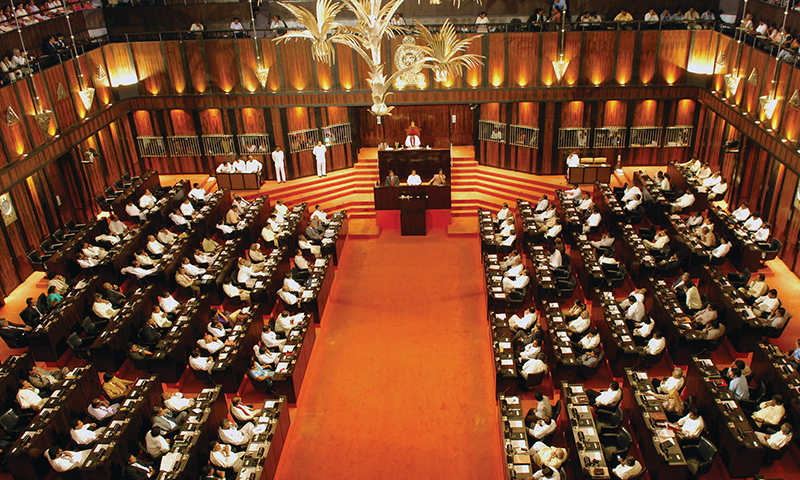
by Lokubanda Tillakaratne
Fforthcoming General Election allows us to revisit the state of the 29 individuals commonly known as the National List—apportion members under Article 99 of the Constitution—to join the 196 elected members in parliament as stipulated in Article 98(1). This List is akin to a shadow bicameral legislature with a moiety of members who have no accountability to the voting electors, the people, because they never had to promise anything to the voters and never received a vote explicitly intended for them.
After the September 21st awakening, citizens are yearning to vote again in the General Election to do something to repeal these unpopular, confusing, and least helpful parts in the Constitution that had soured the meaning of governing and supremacy of consent of the governed.
As stipulated in Article 93, voting for Members of Parliament (MPs) is a ‘free’ and ‘equal’ process with secret ballots of the people. In practice, that only applies to the 196 members of the 225-member body in parliament. The voters do not have any direct means to express their preference on the balance of 29 members. That preference is the unfettered prerogative of the party hierarchy, which proposes the names to be considered as potential MPs! The qualification to be nominated into the parliament under this List category is allegiance to and friendship with the party leaders. The Constitution had sidelined the consent of the people in this instance.
After the vote counts at the forthcoming General Election for the 196 representatives, the Commissioner of Elections will announce the 29 representatives selected as per Article 99A to complete the 225-members.
For the upcoming election, the Commissioner of Elections has already proposed and published nominees for this list from each party. However, the Constitution has not offered a mechanism for the electors to vote for the List members. Instead, it allows votes cast by the electors earlier in the day for the 196 to be dusted off and recycled by way of a calculation to apportion 29 names that will become the National List.
On the election night, meanwhile, potential members of this List will revel with the party leaders and bigwigs in Colombo watching the vote count, not for them but for electors who will earn the Just Powers from the masses for governing. They are partying and waiting for the cast votes to be re-used to make the List. The List hopefuls mingle in the cream of the party spending political equity hoping for a place in the 29 group. These individuals probably never left the boundary of their cozy homes to put up a poster on a street corner or hang a string of bunting across main street begging for votes for them. Such low-rung jobs are the burden of the commoners, the 196, not the ones chosen in party headquarters.
An elector can call this a second-tier group of names that gets the same powers as the 196 to govern. But the List members have diffused responsibilities, and some even get ministerial portfolios soon after taking the oath of office. So, without ever having promised anything to the people, this group gets a free ride to the Diyavanna Oya people’s house to benefit from the heavenly perks for five years without ever declaring their position on any issue affecting the lives of the electors. Sweet pensions await them at the end of the term.
Some members of this List have been MPs in parliament through this process since 1994, a full generation and more, without ever receiving a single vote, and some names have been nominated for consecutive terms by diverse parties. Some are past 90 years of age and still seek to gain entrance through the current list published a few weeks ago. This makes this hardly democracy, but a List for a form of old-fashioned gerontocracy.
The recent thundering response from the electorate yearning for youth opens the gates to look seriously at this unusual system of supposed ‘representation’ of people by a motley group of individuals.
Article 99A of the Constitution defining this 29-member List as ‘elected’ is a misnomer. This is only a group primarily known to the party leadership which does the nomination. From the composition and past and present conduct of the List members, it appears those who do the nomination lack discernment and concern for the people and the electoral process.
Recently concluded parliamentary nomination shows what’s wrong with this process. Apportion of 29 individuals as representatives cannot be considered even a Referendum as it is silent in Articles relating to the process of election of President and Representatives. Few individuals who failed badly in the recently held presidential election now appear in the proposed National List for the honour of governing as an MP. A group of men and women, some unknown to many, shall be rammed upon us through a different list as per the Constitution. This List receives legitimacy as MPs only after using votes we cast to elect the other group, the 196 MPs. The well-known secret is that the 29-member group, which could not convince electors to vote for it or would not be likely to win an election, gets the privilege now to govern the electors, We the People.
Article 99 is a vehicle for favouritism and nepotism. The List seems to carry strands of DNA showing connectivity to diverse lines of political ancestry going back to early 1900s. Some have failed or are tired of their other interests or think inclusion in the List might enhance their opportunities for new pursuits. The consensus among the electors is that this List has become a landing spot for spouses, sons, and daughters of sitting or former politicians, retirees, and financial backers of the party to govern without an electoral consent. Others are close followers of the political echelon, and some are in occupations with nothing to do with governing.
After every election cycle, the new List is headed for perks like free housing in Colombo, V8-class behemoths, or luxury sedans with windows with tinted glass, all at the expense of the people. While holding office, when they get out of the car, they walk with the ostentation of a peacock. When they lose, they hide the car in a friend’s garage and disappear like Hippos out of water. To evict them from the government issued house in Colombo, the only way is to smoke them out like we do with a bee-hive.
These perks are only dreams for a teacher with 20 years of service in the Wellaragama school of 180 students in Galenbindunuwewa Education Zone. He must beg for a loan to build his home. With the first installment cheque, before starting on the foundation, he must erect the electrified elephant fence around the house plot.
Giving the powers and privileges of 196 to the 29 moiety of membership too in the parliament is a half-cooked process. Only one group goes through the rigours of the competitive electoral process while the other group, the chosen ones, gets its pass to parliament on a silver platter without shedding a drop of sweat. They come to represent people as an all-Island team without any mandate, consent of the people, or electoral district boundary which is mandated for the 196. Theirs is a shore-to-shore boundary. Although the National List is constitutional, this manifestly odd practice on the fringes and below surface democracy has been a source of dissatisfaction and discussion among the people. It is a broken moment in Sri Lanka’s democratic process we hold dear.
While the elected 196 representatives have earned the honour by going from door to door in the district, the List members have never come before the people asking for votes. They never get off stage. After failing in previous elections, some had a minimal chance of succeeding at another election to be elevated to the real ranks of the elected. The electors will not get an opportunity to hear from the List collectively or individually to know what their policy proposals for a particular electoral district are. The List members sit in the august chamber anyway, with the blessings of genealogical magic and the know-how of the party hierarchy.
The right to govern is a privilege earned by the representatives through votes of the governed. While the 196 passes this test, from the way the 29 group was nominated, it shows it is exempted from that test. The former earns the honour after campaigning at a granular level, while the latter, the handpicked colleagues of the party stratosphere, are handed the keys to the parliament at the party office in Colombo.
Political leadership has learned ways to circumvent the original intent of Article 99A. The process of the 29 is sullied, often wiled, and wandered off from the universal democratic maxim best described in the classic document of democracy, the American Declaration of Independence – governments are instituted among men, deriving their just powers from the consent of the governed. For the 99A, consent of the party hierarchy is what matters.
With the mandate of this Article, acutely contrary to the Just Powers maxim, the framers of the Constitution have left us with a problem. The National List supposedly was intended to safeguard the underrepresented groups and to augment the experience and expertise capital in the legislative chamber of the elected members. It was an attempt to uphold fairness to the people and encourage pluralistic themes society needs. With a formula prescribed for the tumultuous times we experienced in the early 1980s behind us, I believe time has come to open the conversation about the pros and cons of the National List model.
The past 15 years have shown Sri Lanka has moved past those treacherous times of the 80s. The country enjoys a precious state of ethnic harmony, understanding, and respect for each other, a marked distinction from the encumbrances that plagued us in the past.
Although the intent of the drafters of the Constitution had been sincere and timely, every class of previous Lists sitting in the parliament consisted of few individuals with questionable competency or potential for ability to govern. What part of national and public interest they represent is muddied, to say the least.
Furthermore, the List took its own evolutionary path, not envisioned or expected by the framers, and now appears outdated and unnecessary.
Thus, the twin or binary confusion of the moieties in the parliament chamber begs the question: If experience and expertise were prerequisites for the job of being an MP in the National List category, why not seek the same from the elected, the 196, as well? Or, since such a prerequisite is not required from the elected 196, why not ask the 29 group to enter the electoral process as well, representing assigned districts, and join as conventional MPs?
On the other hand, if the National List of 29 is so indispensable for the interests of the country as much as 196, why bother to mortgage the country to hold the elections to bring in the latter? Instead, why not commission the party leadership to nominate all 225? A few typed sheets of names will do the job. Money saved by this change will allow the Treasury to buy the basic needs of the people. Remember the Panadol days?
In a peculiar way, this governing model reminds me of the allegory in the story of the extraordinary twins in Mark Twain’s Pudd’nhead Wilson (1894). The twins, Italian counts Angelo and Luigi, immigrated to Dawson’s Landing, a frontier town on the banks of Mississippi River. They are conjoined at neck down, have two talking heads, four arms, one body, and two legs. The two heads can think differently and talk things simultaneously; four arms can move whichever way a head prefers, but two legs make the twins walk as one. The two heads have mutually agreed that every Sunday at 12 midnight ownership of the legs changed from one twin to the other. When one gets sick, even if the other’s head is healthy, the whole system breaks down and both heads feel the pain. Then the citizens in Dawson’s Landing call the only practicing physician in town, Dr. Claypool, who is yet to pass the licensing exam.
It is reassuring that since our electoral process has 70 years of experience, voters in Sri Lanka will do without Dr. Claypool’s medical Rx consisting of ingredients like a grain of gold, a bone of the stag’s heart, shavings of ivory, dates, roses, and scores of other items prescribed to ailing twins to correct the conjoined twin syndrome the Constitution has overwhelmed us with. Instead, voters will get the opportunity to heal the 29-class disorder at this forthcoming election. They can vote to stop the backdoor culture of governing and do something to remove the National List misnomer from the Constitution.
This time around, voters must think of our shadow bicameral system of governing while waiting in line to vote. They are at the doorstep of correcting this oddity by voting in a two-thirds majority for a political party of their choice.
Twins’ Story Update
: After Luigi was elected for Dawson’s Landing City Council, he was not allowed to attend 6-member executive council meetings open only to elected members. Council member Luigi was not allowed to sit in the Council chamber because Angelo was not eligible to sit as he was not an elected member. Without Luigi in the council meetings, there was no quorum, law making came to a standstill, and the town was paralyzed. It tried every loophole to make it possible for the twins to sit at the table but found no legal way to do it.
So, they hanged Luigi.
Features
Meet the women protecting India’s snow leopards
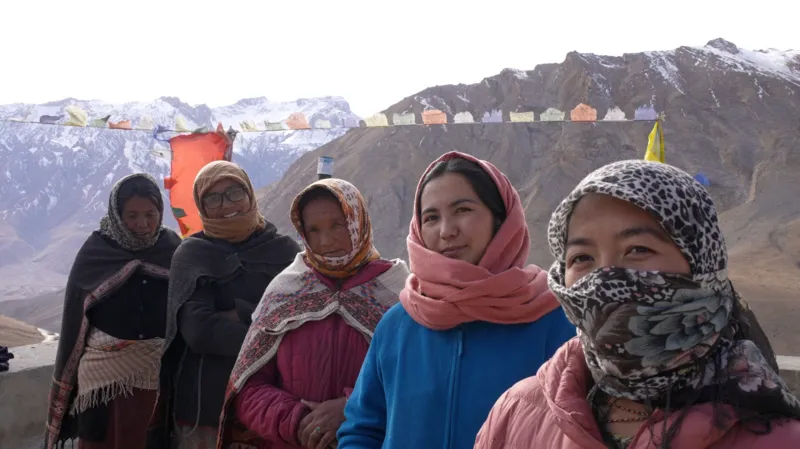
In one of India’s coldest and most remote regions, a group of women have taken on an unlikely role: protecting one of Asia’s most elusive predators, the snow leopard.
Snow leopards are found in just 12 countries across Central and South Asia. India is home to one of the world’s largest populations, with a nationwide survey in 2023 – the first comprehensive count ever carried out in the country – estimating more than 700 animals, .
One of the places they roam is around Kibber village in Himachal Pradesh state’s Spiti Valley, a stark, high-altitude cold desert along the Himalayan belt. Here, snow leopards are often called the “ghosts of the mountains”, slipping silently across rocky slopes and rarely revealing themselves.
For generations, the animals were seen largely as a threat, for attacking livestock. But attitudes in Kibber and neighbouring villages are beginning to shift, as people increasingly recognise the snow leopard’s role as a top predator in the food chain and its importance in maintaining the region’s fragile mountain ecosystem.
Nearly a dozen local women are now working alongside the Himachal Pradesh forest department and conservationists to track and protect the species, playing a growing role in conservation efforts.
Locally, the snow leopard is known as Shen and the women call their group “Shenmo”. Trained to install and monitor camera traps, they handle devices fitted with unique IDs and memory cards that automatically photograph snow leopards as they pass.
“Earlier, men used to go and install the cameras and we kept wondering why couldn’t we do it too,” says Lobzang Yangchen, a local coordinator working with a small group supported by the non-profit Nature Conservation Foundation (NCF) in collaboration with the forest department.
Yangchen was among the women who helped collect data for Himachal Pradesh’s snow leopard survey in 2024, which found that the state was home to 83 snow leopards – up from 51 in 2021.

The survey documented snow leopards and 43 other species using camera traps spread across an area of nearly 26,000sq km (10,000sq miles). Individual leopards were identified by the unique rosette patterns on their fur, a standard technique used for spotted big cats. The findings are now feeding into wider conservation and habitat-management plans.
“Their contribution was critical to identifying individual animals,” says Goldy Chhabra, deputy conservator of forests with the Spiti Wildlife Division.
Collecting the data is demanding work. Most of it takes place in winter, when heavy snowfall pushes snow leopards and their prey to lower altitudes, making their routes easier to track.
On survey days, the women wake up early, finish household chores and gather at a base camp before travelling by vehicle as far as the terrain allows. From there, they trek several kilometres to reach camera sites, often at altitudes above 14,000ft (4,300m), where the thin air makes even simple movement exhausting.
The BBC accompanied the group on one such trek in December. After hours of walking in biting cold, the women suddenly stopped on a narrow trail.
Yangchen points to pugmarks in the dust: “This shows the snow leopard has been here recently. These pugmarks are fresh.”
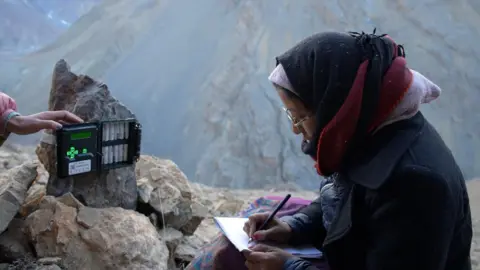
Along with pugmarks, the team looks for other signs, including scrapes and scent‑marking spots, before carefully fixing a camera to a rock along the trail.
One woman then carries out a “walk test”, crawling along the path to check whether the camera’s height and angle will capture a clear image.
The group then moves on to older sites, retrieving memory cards and replacing batteries installed weeks earlier.
By mid-afternoon, they return to camp to log and analyse the images using specialised software – tools many had never encountered before.
“I studied only until grade five,” says Chhering Lanzom. “At first, I was scared to use the computer. But slowly, we learned how to use the keyboard and mouse.”
The women joined the camera-trapping programme in 2023. Initially, conservation was not their motivation. But winters in the Spiti Valley are long and quiet, with little agricultural work to fall back on.
“At first, this work on snow leopards didn’t interest us,” Lobzang says. “We joined because we were curious and we could earn a small income.”
The women earn between 500 ($5.46; £4) and 700 rupees a day.
But beyond the money, the work has helped transform how the community views the animal.

“Earlier, we thought the snow leopard was our enemy,” says Dolma Zangmo, a local resident. “Now we think their conservation is important.”
Alongside survey work, the women help villagers access government insurance schemes for their livestock and promote the use of predator‑proof corrals – stone or mesh enclosures that protect animals at night.
Their efforts come at a time of growing recognition for the region. Spiti Valley has recently been included in the Cold Desert Biosphere Reserve, a Unesco-recognised network aimed at conserving fragile ecosystems while supporting local livelihoods.
As climate change reshapes the fragile trans-Himalayan landscape, conservationists say such community participation will be crucial to safeguarding species like the snow leopard.
“Once communities are involved, conservation becomes more sustainable,” says Deepshikha Sharma, programme manager with NCF’s High Altitudes initiative.
“These women are not just assisting, they are becoming practitioners of wildlife conservation and monitoring,” she adds.
As for the women, their work makes them feel closer to their home, the village and the mountains that raised them, they say.
“We were born here, this is all we know,” Lobzang says. “Sometimes we feel afraid because these snow leopards are after all predatory animals, but this is where we belong.”
[BBC]
Features
Freedom for giants: What Udawalawe really tells about human–elephant conflict
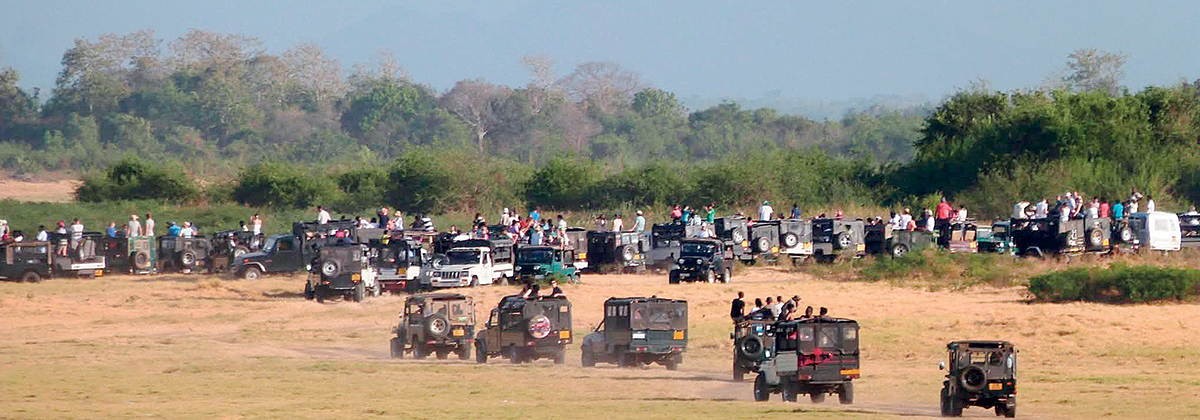
If elephants are truly to be given “freedom” in Udawalawe, the solution is not simply to open gates or redraw park boundaries. The map itself tells the real story — a story of shrinking habitats, broken corridors, and more than a decade of silent but relentless ecological destruction.
“Look at Udawalawe today and compare it with satellite maps from ten years ago,” says Sameera Weerathunga, one of Sri Lanka’s most consistent and vocal elephant conservation activists. “You don’t need complicated science. You can literally see what we have done to them.”
What we commonly describe as the human–elephant conflict (HEC) is, in reality, a land-use conflict driven by development policies that ignore ecological realities. Elephants are not invading villages; villages, farms, highways and megaprojects have steadily invaded elephant landscapes.
Udawalawe: From Landscape to Island
Udawalawe National Park was once part of a vast ecological network connecting the southern dry zone to the central highlands and eastern forests. Elephants moved freely between Udawalawe, Lunugamvehera, Bundala, Gal Oya and even parts of the Walawe river basin, following seasonal water and food availability.
Today, Udawalawe appears on the map as a shrinking green island surrounded by human settlements, monoculture plantations, reservoirs, electric fences and asphalt.
“For elephants, Udawalawe is like a prison surrounded by invisible walls,” Sameera explains. “We expect animals that evolved to roam hundreds of square nationakilometres to survive inside a box created by humans.”
Elephants are ecosystem engineers. They shape forests by dispersing seeds, opening pathways, and regulating vegetation. Their survival depends on movement — not containment. But in Udawalawa, movement is precisely what has been taken away.
Over the past decade, ancient elephant corridors have been blocked or erased by:
Irrigation and agricultural expansion
Tourism resorts and safari infrastructure
New roads, highways and power lines
Human settlements inside former forest reserves
“The destruction didn’t happen overnight,” Sameera says. “It happened project by project, fence by fence, without anyone looking at the cumulative impact.”
The Illusion of Protection
Sri Lanka prides itself on its protected area network. Yet most national parks function as ecological islands rather than connected systems.
“We think declaring land as a ‘national park’ is enough,” Sameera argues. “But protection without connectivity is just slow extinction.”
Udawalawe currently holds far more elephants than it can sustainably support. The result is habitat degradation inside the park, increased competition for resources, and escalating conflict along the boundaries.
“When elephants cannot move naturally, they turn to crops, tanks and villages,” Sameera says. “And then we blame the elephant for being a problem.”
The Other Side of the Map: Wanni and Hambantota
Sameera often points to the irony visible on the very same map. While elephants are squeezed into overcrowded parks in the south, large landscapes remain in the Wanni, parts of Hambantota and the eastern dry zone where elephant density is naturally lower and ecological space still exists.
“We keep talking about Udawalawe as if it’s the only place elephants exist,” he says. “But the real question is why we are not restoring and reconnecting landscapes elsewhere.”
The Hambantota MER (Managed Elephant Reserve), for instance, was originally designed as a landscape-level solution. The idea was not to trap elephants inside fences, but to manage land use so that people and elephants could coexist through zoning, seasonal access, and corridor protection.
“But what happened?” Sameera asks. “Instead of managing land, we managed elephants. We translocated them, fenced them, chased them, tranquilised them. And the conflict only got worse.”
The Failure of Translocation
For decades, Sri Lanka relied heavily on elephant translocation as a conflict management tool. Hundreds of elephants were captured from conflict zones and released into national parks like Udawalawa, Yala and Wilpattu.
The logic was simple: remove the elephant, remove the problem.
The reality was tragic.
“Most translocated elephants try to return home,” Sameera explains. “They walk hundreds of kilometres, crossing highways, railway lines and villages. Many die from exhaustion, accidents or gunshots. Others become even more aggressive.”
Scientific studies now confirm what conservationists warned from the beginning: translocation increases stress, mortality, and conflict. Displaced elephants often lose social structures, familiar landscapes, and access to traditional water sources.
“You cannot solve a spatial problem with a transport solution,” Sameera says bluntly.
In many cases, the same elephant is captured and moved multiple times — a process that only deepens trauma and behavioural change.
Freedom Is Not About Removing Fences
The popular slogan “give elephants freedom” has become emotionally powerful but scientifically misleading. Elephants do not need symbolic freedom; they need functional landscapes.
Real solutions lie in:
Restoring elephant corridors
Preventing development in key migratory routes
Creating buffer zones with elephant-friendly crops
Community-based land-use planning
Landscape-level conservation instead of park-based thinking
“We must stop treating national parks like wildlife prisons and villages like war zones,” Sameera insists. “The real battlefield is land policy.”
Electric fences, for instance, are often promoted as a solution. But fences merely shift conflict from one village to another.
“A fence does not create peace,” Sameera says. “It just moves the problem down the line.”
A Crisis Created by Humans
Sri Lanka loses more than 400 elephants and nearly 100 humans every year due to HEC — one of the highest rates globally.
Yet Sameera refuses to call it a wildlife problem.
“This is a human-created crisis,” he says. “Elephants are only responding to what we’ve done to their world.”
From expressways cutting through forests to solar farms replacing scrublands, development continues without ecological memory or long-term planning.
“We plan five-year political cycles,” Sameera notes. “Elephants plan in centuries.”
The tragedy is not just ecological. It is moral.
“We are destroying a species that is central to our culture, religion, tourism and identity,” Sameera says. “And then we act surprised when they fight back.”
The Question We Avoid Asking
If Udawalawe is overcrowded, if Yala is saturated, if Wilpattu is bursting — then the real question is not where to put elephants.
The real question is: Where have we left space for wildness in Sri Lanka?
Sameera believes the future lies not in more fences or more parks, but in reimagining land itself.
“Conservation cannot survive as an island inside a development ocean,” he says. “Either we redesign Sri Lanka to include elephants, or one day we’ll only see them in logos, statues and children’s books.”
And the map will show nothing but empty green patches — places where giants once walked, and humans chose. roads instead.
By Ifham Nizam
Features
Challenges faced by the media in South Asia in fostering regionalism
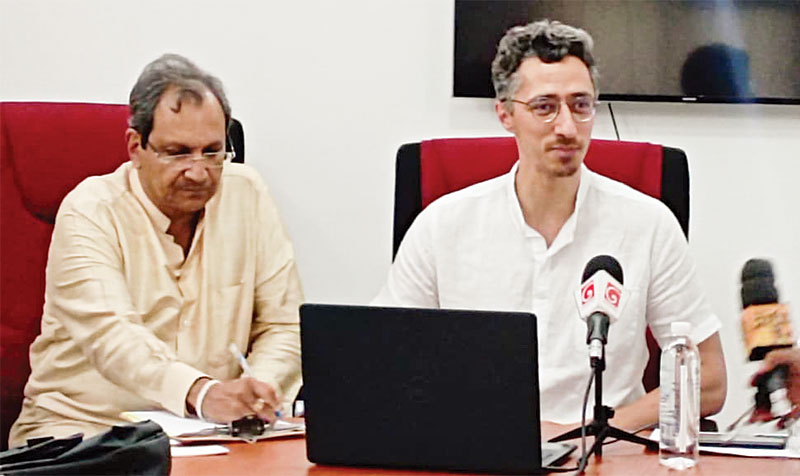
 SAARC or the South Asian Association for Regional Cooperation has been declared ‘dead’ by some sections in South Asia and the idea seems to be catching on. Over the years the evidence seems to have been building that this is so, but a matter that requires thorough probing is whether the media in South Asia, given the vital part it could play in fostering regional amity, has had a role too in bringing about SAARC’s apparent demise.
SAARC or the South Asian Association for Regional Cooperation has been declared ‘dead’ by some sections in South Asia and the idea seems to be catching on. Over the years the evidence seems to have been building that this is so, but a matter that requires thorough probing is whether the media in South Asia, given the vital part it could play in fostering regional amity, has had a role too in bringing about SAARC’s apparent demise.
That South Asian governments have had a hand in the ‘SAARC debacle’ is plain to see. For example, it is beyond doubt that the India-Pakistan rivalry has invariably got in the way, particularly over the past 15 years or thereabouts, of the Indian and Pakistani governments sitting at the negotiating table and in a spirit of reconciliation resolving the vexatious issues growing out of the SAARC exercise. The inaction had a paralyzing effect on the organization.
Unfortunately the rest of South Asian governments too have not seen it to be in the collective interest of the region to explore ways of jump-starting the SAARC process and sustaining it. That is, a lack of statesmanship on the part of the SAARC Eight is clearly in evidence. Narrow national interests have been allowed to hijack and derail the cooperative process that ought to be at the heart of the SAARC initiative.
However, a dimension that has hitherto gone comparatively unaddressed is the largely negative role sections of the media in the SAARC region could play in debilitating regional cooperation and amity. We had some thought-provoking ‘takes’ on this question recently from Roman Gautam, the editor of ‘Himal Southasian’.
Gautam was delivering the third of talks on February 2nd in the RCSS Strategic Dialogue Series under the aegis of the Regional Centre for Strategic Studies, Colombo, at the latter’s conference hall. The forum was ably presided over by RCSS Executive Director and Ambassador (Retd.) Ravinatha Aryasinha who, among other things, ensured lively participation on the part of the attendees at the Q&A which followed the main presentation. The talk was titled, ‘Where does the media stand in connecting (or dividing) Southasia?’.
Gautam singled out those sections of the Indian media that are tamely subservient to Indian governments, including those that are professedly independent, for the glaring lack of, among other things, regionalism or collective amity within South Asia. These sections of the media, it was pointed out, pander easily to the narratives framed by the Indian centre on developments in the region and fall easy prey, as it were, to the nationalist forces that are supportive of the latter. Consequently, divisive forces within the region receive a boost which is hugely detrimental to regional cooperation.
Two cases in point, Gautam pointed out, were the recent political upheavals in Nepal and Bangladesh. In each of these cases stray opinions favorable to India voiced by a few participants in the relevant protests were clung on to by sections of the Indian media covering these trouble spots. In the case of Nepal, to consider one example, a young protester’s single comment to the effect that Nepal too needed a firm leader like Indian Prime Minister Narendra Modi was seized upon by the Indian media and fed to audiences at home in a sensational, exaggerated fashion. No effort was made by the Indian media to canvass more opinions on this matter or to extensively research the issue.
In the case of Bangladesh, widely held rumours that the Hindus in the country were being hunted and killed, pogrom fashion, and that the crisis was all about this was propagated by the relevant sections of the Indian media. This was a clear pandering to religious extremist sentiment in India. Once again, essentially hearsay stories were given prominence with hardly any effort at understanding what the crisis was really all about. There is no doubt that anti-Muslim sentiment in India would have been further fueled.
Gautam was of the view that, in the main, it is fear of victimization of the relevant sections of the media by the Indian centre and anxiety over financial reprisals and like punitive measures by the latter that prompted the media to frame their narratives in these terms. It is important to keep in mind these ‘structures’ within which the Indian media works, we were told. The issue in other words, is a question of the media completely subjugating themselves to the ruling powers.
Basically, the need for financial survival on the part of the Indian media, it was pointed out, prompted it to subscribe to the prejudices and partialities of the Indian centre. A failure to abide by the official line could spell financial ruin for the media.
A principal question that occurred to this columnist was whether the ‘Indian media’ referred to by Gautam referred to the totality of the Indian media or whether he had in mind some divisive, chauvinistic and narrow-based elements within it. If the latter is the case it would not be fair to generalize one’s comments to cover the entirety of the Indian media. Nevertheless, it is a matter for further research.
However, an overall point made by the speaker that as a result of the above referred to negative media practices South Asian regionalism has suffered badly needs to be taken. Certainly, as matters stand currently, there is a very real information gap about South Asian realities among South Asian publics and harmful media practices account considerably for such ignorance which gets in the way of South Asian cooperation and amity.
Moreover, divisive, chauvinistic media are widespread and active in South Asia. Sri Lanka has a fair share of this species of media and the latter are not doing the country any good, leave alone the region. All in all, the democratic spirit has gone well into decline all over the region.
The above is a huge problem that needs to be managed reflectively by democratic rulers and their allied publics in South Asia and the region’s more enlightened media could play a constructive role in taking up this challenge. The latter need to take the initiative to come together and deliberate on the questions at hand. To succeed in such efforts they do not need the backing of governments. What is of paramount importance is the vision and grit to go the extra mile.
-

 Business7 days ago
Business7 days agoHayleys Mobility ushering in a new era of premium sustainable mobility
-

 Business4 days ago
Business4 days agoSLIM-Kantar People’s Awards 2026 to recognise Sri Lanka’s most trusted brands and personalities
-

 Business7 days ago
Business7 days agoAdvice Lab unveils new 13,000+ sqft office, marking major expansion in financial services BPO to Australia
-

 Business7 days ago
Business7 days agoArpico NextGen Mattress gains recognition for innovation
-

 Business6 days ago
Business6 days agoAltair issues over 100+ title deeds post ownership change
-

 Editorial7 days ago
Editorial7 days agoGovt. provoking TUs
-

 Business6 days ago
Business6 days agoSri Lanka opens first country pavilion at London exhibition
-

 Business5 days ago
Business5 days agoAll set for Global Synergy Awards 2026 at Waters Edge















